United Nations Secretary-General Antonio Guterres has welcomed an accord brokered by China seeking reconciliation between Hamas and other Palestinian factions.
“I think all steps towards unity are to be welcomed and encouraged,” his spokesman Stephane Dujarric said, adding that Guterres “very much welcomes the signing of the Beijing Declaration by the Palestinian factions.”
Earlier, Hamas, Fatah, and 12 other Palestinian factions signed a national unity agreement in Beijing. Announced by Chinese Foreign Minister Wang Yi on Tuesday, the agreement aims to establish an “interim national reconciliation government.”
This agreement is a notable step towards reconciling Hamas and Fatah, the two primary Palestinian political factions that have been at odds since a violent conflict in 2006. Senior Hamas official Mousa Abu Marzouk praised the agreement as a crucial path to national unity, emphasizing its importance in countering Israeli control over Gaza.
Mustafa Barghouti, secretary-general of the Palestinian National Initiative, highlighted that this agreement surpasses previous reconciliation attempts. Key elements include the formation of an interim national unity government, unified Palestinian leadership ahead of elections, the election of a new Palestinian National Council, and a general declaration of unity against Israeli aggression.
Barghouti stressed the agreement’s significance in blocking Israeli efforts to impose a collaborative structure harmful to Palestinian interests. He asserted that the unity government is essential for maintaining Palestinian control over Gaza and preventing Israeli dominance.
The reconciliation between Hamas and Fatah is seen as a pivotal moment in Palestinian politics. Abu Marzouk described the current situation as a “historic junction,” with Palestinians uniting in their struggle. Hamas, known for its armed resistance, and Fatah, which prefers peaceful negotiations, have long struggled to reconcile their differences. The ongoing war in Gaza has intensified calls for unity.
Barghouti attributed the war as the primary factor driving the factions together, asserting that unity is the only path forward. He emphasized the importance of not only signing the agreement but also implementing it effectively.
Israel has strongly opposed any Hamas role in Gaza’s governance. Israeli Foreign Minister Israel Katz criticized Palestinian Authority President Mahmoud Abbas for cooperating with Hamas, reaffirming Israel’s stance that it alone will control Gaza post-conflict. Katz dismissed the unity agreement as unrealistic and accused Abbas of embracing terrorism, asserting that Hamas’s rule would be crushed, leaving Abbas powerless.
China, aiming to mediate in the Israel-Palestine conflict, hosted the talks that led to the unity agreement. Chinese Foreign Ministry spokesman Lin Jian emphasized the progress made during the discussions, which involved Hamas’s political leader Ismail Haniyeh and Fatah’s deputy head Mahmoud al-Aloul.










